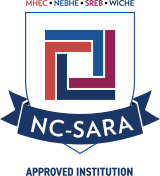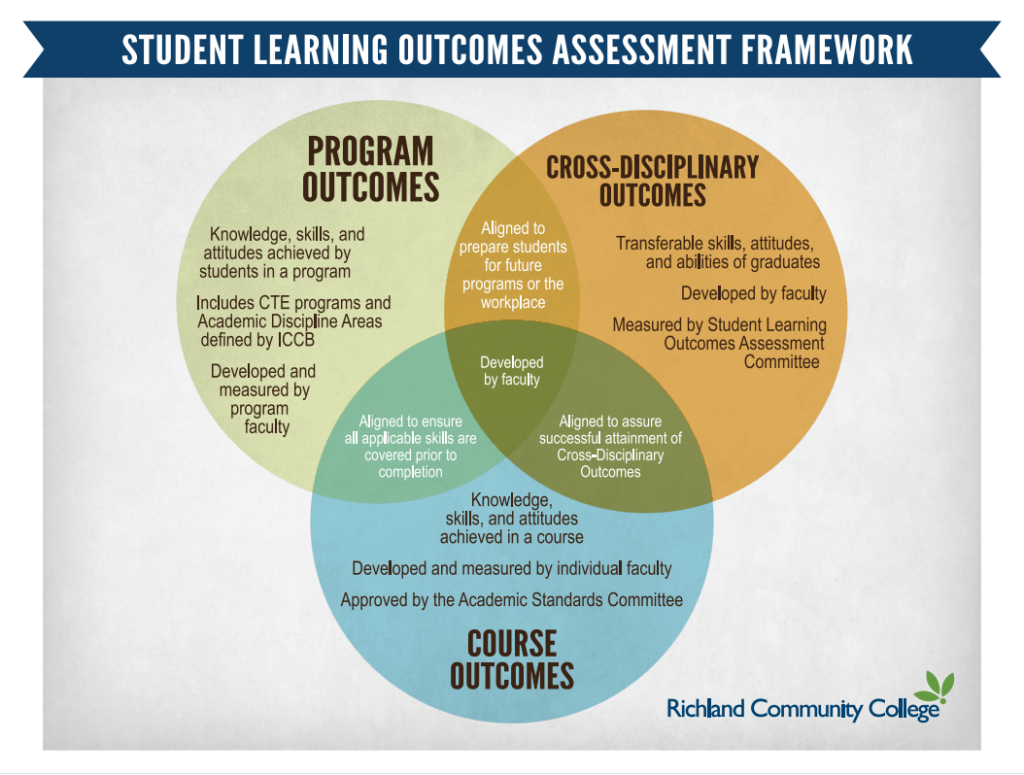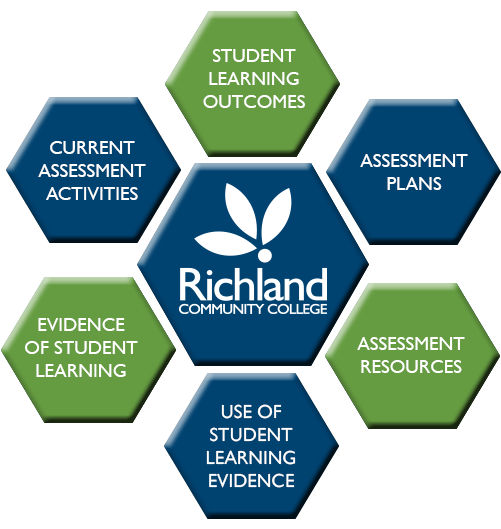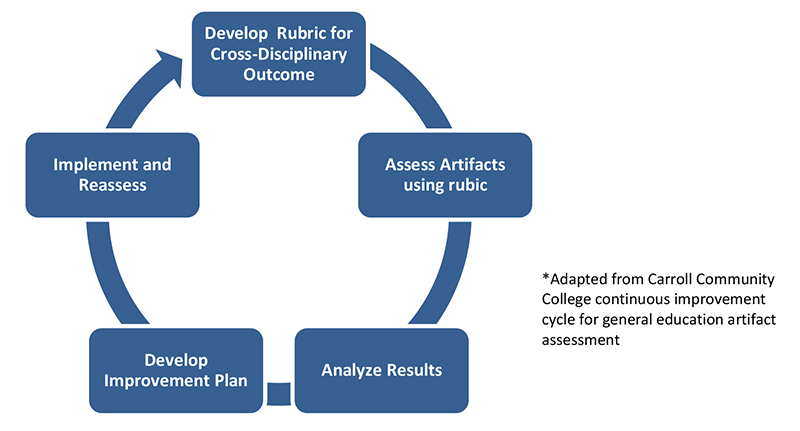Accreditation & Assessment
The Higher Learning Commission
Richland Community College is accredited by the Higher Learning Commission, often referred to as the HLC, and is recognized by the Illinois Community College Board (ICCB).
In general, the HLC and other accrediting bodies focus on the following functions:
- Assessing the quality of academic programs
- Creating a culture of continuous improvement of academic quality
- Involving faculty and staff comprehensively in institutional evaluation and planning
- Establishing criteria for professional certification and licensure
The HLC has established several pathways of accreditation from which an institution can choose to match that institution’s culture and to focus on evidence-based decision-making.
Richland transitioned from the Academic Quality Improvement Program (AQIP) to the Standard Pathway in 2017, completing some final requirements under AQIP and moving to the timeline of the Standard Pathway.
Affirmation of accreditation includes a number of initiatives, also outlined on the Institutional Effectiveness page of the Richland website.
Responding to a series of questions, an institution uses the Assurance Argument to describe systems and processes and the results, following the Department of Education’s Criteria for Accreditation. This Assurance Argument is the compilation of the answers to the question “How do you know that your processes are efficient, effective, and important?” Two Assurance Arguments are completed in the 10-year accreditation cycle. Because Richland was completing the transition to the Standard Pathway, the 2017 Systems Portfolio was a hybrid approach to answering the questions of the Assurance Argument.
In 2023 preparation began on two key components of reaffirmation, the Assurance Argument and the Federal Compliance requirement. The Criterion Leaders Group is directing the development of responses to each Core Component within the five Criteria for Accreditation, and a cross-section of employees assumed responsibility for the Assurance Argument based on their areas of expertise and knowledge of procedures and policies.
Criterion 1 Mission — John Oliver
Criterion 2 Integrity: Ethical and Responsible Conduct — Madonna Brown, Joe Feinstein, Jody Burtnett
Criterion 3 Teaching and Learning: Quality Resources, and Support — Meredith Johnson-Palmer, Dr. Kona Jones
Criterion 4 Teaching and Learning: Evaluation and Improvement — Katie Raisner, Andy Hynds, Dr. Matthew Wiediger
Criterion 5 Institutional Effectiveness, Resources, and Planning — Erin Spanberger, Teena Zindel-McWilliams
The Assurance Argument and Federal Compliance Report were submitted on January 15.
Another component of the Comprehensive Evaluation is the visit by a Peer Review Team for a first-hand view of the workings of an institution and to see in “real time” a verification of what was written in the Assurance Argument. Richland’s Comprehensive Visit occurred in February 2024.
Richland received notification that the Higher Learning Commission has awarded its reaffirmation of accreditation until 2033-2034.
NC-Sara Approved Institution

Richland Community College has been approved to participate in the National Council for State Authorization Reciprocity Agreements. For more information you may visit www.nc-sara.org.
Specialized Accreditation and Professional Licensure
Specialized Accreditation – June 2024
| Program | Accrediting Program | Origination/Reaccreditation Date | Benefits to Student |
| Associate Degree Nursing(ADN)Professional Licensure (PDF File)24 Professional Licensure Table Nursing | Accreditation Commission for Education in Nursing, Inc. (ACEN) | September 1996 Last evaluation visit: Fall 2017; reaccreditation granted. Next Evaluation Visit: Fall 2025 | A peer review process that determines if academic programs meet public confidence |
| Automotive Technology (AAS)Professional Licensure (PDF File) 24 Professional Licensure Table Automotive Technology | Automotive Service Excellence (ASE) | October 2011 (Master Accreditation) Renewed July 2016 through July 2021 Extended to July 2023Accreditation Expiration Date February 1, 2029 | Recommended for employment; students may sit for ASE Certification exams |
| Collision Repair Technology (AAS)Professional Licensure (PDF File) 24 Professional Licensure Table Collision Repair Technology | Automotive Service Excellence (ASE) | Accreditation granted June 20, 2021, through July 1, 2026 | Recommended for employment; students may sit for ASE Certification exams |
| Radiography (AAS)Professional Licensure (PDF File) 24 Professional Licensure Table radiography | Joint Review Committee on Education in Radiologic Technology (JRCERT) | Applied October 2012 Initial accreditation granted: 9/9/2014 Renewed 2017 Next projected site visit Fall 2025 | A peer review process that determines if academic programs meet public confidence |
| Surgical Technology (AAS)Professional Licensure (PDF File)24 Professional Licensure Table Surgical Technology | Commission on Accreditation of Allied Health Education Programs (CAAHEP) | Initial Accreditation: April 22, 1999 Continuing Accreditation: November 15, 2013 Next site visit: February 2024 (awaiting decision at CAAHEP meeting in September 2024) | Graduates required to take National Board of Surgical Technology certification exam |
| Nurse Assistant (CNA) (certificate) (Main campus and Richland Workforce Consortium – Decatur Public Library)Professional Licensure (PDF File) 24 Professional Licensure Table Nurse Assistant | Illinois Department of Public Health | Continued approval: On-campus—August 31, 2021 – August 31, 2023 Workforce Consortium (DPL)— February 28, 2022 – February 28, 2024 | Graduates required to take state competency examination, which leads to CNA certification |
| Healthcare Documentation (AAS)Professional Licensure (PDF File) 24 Professional Licensure Table Healthcare Documentation | Association for Healthcare Documentation Integrity (AHDI) | September 2007 Renewed June 2023 through June 2026 | Certified Healthcare Documentation Specialist credentialing exam available after graduation. |
| Health Information Technology (AAS)Professional Licensure (PDF File) 24 Professional Licensure Table Health Information Technology | Commission on Accreditation for Health Informatics and Information Management Education (CAHIIM) | Approved September 2013 Next review cycle 2023-2024; site visit spring 2024 | Student can sit for Registered Health Information Technician (RHIT) certification exam after graduation. |
| Culinary Arts (AAS)Professional Licensure (PDF File) 24 Professional Licensure Table Culinary Arts | American Culinary Federation (ACF) Education Foundation | Initial approval July 2014 Reaccreditation July 1, 2022 – June 20, 2027 | Credential for certified culinarians |
| Engineering Technology (AAS & Certificate)Professional Licensure (PDF File) 24 Professional Licensure Table Engineering Technology | Manufacturing Skills Standards Council (MSSC) Certified Production Technician (CPT) (Certificate) | Certified as training and testing site Fall 2013 – ongoing. | Recommended for entry-level employment |
| Engineering Technology (AAS & Certificate)Professional Licensure (PDF File) 24 Professional Licensure Table Engineering Technology | Manufacturing Skills Standards Council (MSSC) Certified Logistics Technician (CLT) certification | Certified as training and testing site Spring 2014 – ongoing | Recommended for employment in entry-level Supply Chain Management. |
| Engineering Technology (AAS & Certificate)Professional Licensure (PDF File) 24 Professional Licensure Table Engineering Technology | Manufacturing Skills Standards Council (MSSC) Certified Logistics Associate (CLA) certification | Certified as training and testing site Spring 2014 – ongoing | Recommended for employment in entry-level Supply Chain Management. |
| Emergency Medical Services Paramedic (AAS & Certificates)Professional Licensure (PDF) File 24 Professional Licensure Table EMS | Commission on Accreditation of Allied Health Education Programs (CAAHEP) | Initial Accreditation — September 15, 2023; next evaluation scheduled for 2028 | Recommended for employment as a Paramedic. |
Before enrolling in a program intended to satisfy a particular state’s educational requirements for the practice of a particular occupation requiring licensure, students are strongly encouraged to review the information under the respective program in the current Richland Catalog. Students are also encouraged to contact the appropriate licensing agency to seek information and additional guidance before beginning a program outside of their home state. Institutions participating in the National Council for State Authorization Reciprocity Agreements (NC-SARA) are required to provide related disclosures; institutions that participate in federal student financial aid programs must meet similar federal requirements.
If Richland Community College has not determined whether a program meets the educational requirements for licensure or certification outside the state of Illinois, the student should contact the licensing entity to determine whether the Richland program meets the educational requirements for licensure or certification in the state of residence or employment.
Assessment
The Student Learning Outcomes Assessment Committee (SLOA) oversees planning and implementation of Program and Cross-Disciplinary (Institutional) Outcomes Assessment. Assessment efforts help ensure that Richland fulfills its mission of empowering individuals through learning and to forge partnerships that grow communities.
Campus plans for gathering evidence of student learning might include institution-wide or program specific approaches that convey how student learning will be assessed, the data collection tools and approaches that will be used, and the timeline for implementation.


Cross-Disciplinary Outcomes
Cross-disciplinary outcomes (CDO’s) are defined as “learning outcomes comprised of transferable skills, attitudes, and abilities to be mastered by all learners completing a degree or certificate at Richland.” Cross-disciplinary outcomes go beyond a specific program, major, or discipline thread, are integrated throughout the learning experience, and are often set as learning goals. The current CDO’s — Oral Communication, Written Communication, Information Literacy, and Critical and Creative Thinking — are vital learning outcomes that prepare students for life outside Richland Community College. Academic and business leaders look for students who show evidence of these outcomes to solve important problems they will encounter in college and the workplace.
Student learning outcomes statements clearly state the expected knowledge, skills, attitudes, competencies, and habits of mind that students are expected to acquire at an institution of higher education.

Cross Disciplinary Outcomes Assessment Plan
| Cross-Disciplinary Outcome Timeline | Artifact Collection | Artifact Evaluation | Analysis & Improvement |
| CDO 1 Written Communication | SPRING 2023 | FALL 2023 | SPRING 2024 |
| CDO 2 Oral Communication | SPRING 2024 | FALL 2024 | SPRING 2025 |
| CDO 3 Information Literacy | SPRING 2025 | FALL 2025 | SPRING 2026 |
| CDO 4 Critical and Creative Thinking | SPRING 2026 | FALL 2026 | SPRING 2027 |
Program Student Learning Outcomes
Each Career and Technical Education (CTE) Program and each academic discipline has identified learning outcomes that will be addressed in the scope of the coursework for the CTE programs and in courses in various academic/transfer disciplines. The Student Learning Assessment System includes processes for assessing the PLSO and CDO and shows how Richland continues to demonstrate its commitment to meaningful and sustainable assessment of student learning.
To improve student learning, the Student Learning Outcomes Assessment Committee (SLOA) and its faculty sub teams work regularly to ensure proper execution of the assessment processes including working with all faculty in collecting and analyzing PSLO and CDO.
Cross Disciplinary Outcomes Assessment Process
Assessment Academy
In 2023 Richland Community College was selected to participate in the Assessment Academy sponsored by the Higher Learning Commission. In this four-year program Richland will focus efforts on assessment projects that will strengthen faculty and staff understanding of assessment, clarify procedures for collection and analysis of artifacts, and ultimately to improve student learning. A team participated in the Assessment Academy Roundtable in June 2023 to identify current strengths and challenges with skilled practitioners and to create an action plan for improvements.
Current Assessment Academy Team members include the following:
- Andy Hynds, Executive Dean, Academic Services, and Dean, Mathematics, Science, and Business Division
- Meredith Johnson-Palmer, Executive Dean, Student Success
- Dr. Tasha Jones, Interim Dean, Health Professions Division
- Jacque Manicki, Director, Academic Success Center
- Erin Spanberger, Institutional Research
- Dr. Matthew Wiediger, Instructor, Psychology
- Teena Zindel-McWilliams, Director, Institutional and Academic Planning
The Team will work with the Student Learning Outcomes Assessment (SLOA) Committee to propel assessment into an even more prominent place in the student learning picture at Richland.
Assessment Resources
The framework and definitions were provided courtesy of the National Institute for Learning Outcomes Assessment.
Citation: National Institute for Learning Outcomes Assessment (2011). Transparency Framework. Urbana, IL: University of Illinois and Indiana University, National Institute for Learning Outcomes Assessment (NILOA).